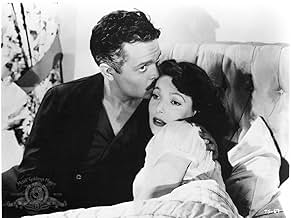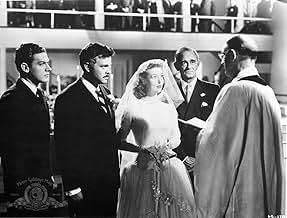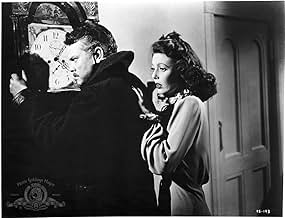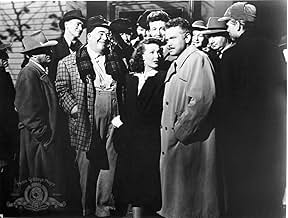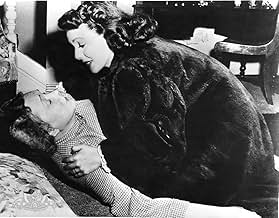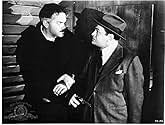AVALIAÇÃO DA IMDb
7,3/10
29 mil
SUA AVALIAÇÃO
Um investigador da Comissão de Crimes de Guerra viaja para Connecticut para encontrar um infame nazista.Um investigador da Comissão de Crimes de Guerra viaja para Connecticut para encontrar um infame nazista.Um investigador da Comissão de Crimes de Guerra viaja para Connecticut para encontrar um infame nazista.
- Indicado a 1 Oscar
- 2 indicações no total
David Bond
- Student
- (não creditado)
John Brown
- Passport Photographer
- (não creditado)
Nancy Evans
- Undetermined Role
- (não creditado)
Adolph Faylauer
- War Crimes Commision Member
- (não creditado)
Fred Godoy
- Undetermined Role
- (não creditado)
Theodore Gottlieb
- Fairbright
- (não creditado)
Joseph Granby
- Undetermined Role
- (não creditado)
Ethan Laidlaw
- Todd
- (não creditado)
Enredo
Você sabia?
- CuriosidadesThis was the first mainstream American movie to feature footage of Nazi concentration camps following World War II.
- Erros de gravaçãoTwo palm trees are visible in the first scene depicting the fictional Connecticut town.
- Citações
Mr. Wilson: Well, who but a Nazi would deny that Karl Marx was a German because he was a Jew?
- Versões alternativasAlso available in a computer-colorized version.
- ConexõesEdited into Ninja the Mission Force: Citizen Ninja (2012)
Avaliação em destaque
The reason people talk about "The Stranger" 60 years later is because it was Orson Welles' first directorial effort after he was evicted from the Mercury Theater cocoon which gave us "Citizen Kane" as well as its worthy follow-ups "The Magnificent Ambersons" and "It's All True." The reason "The Stranger" is worth talking about is because it features one of the greatest performances by that criminally-ignored actor, Edward G. Robinson.
Robinson plays Mr. Wilson, an anti-Nazi hot on the trail of a war-crimes-tribunal escapee Wilson hopes will lead him to Franz Kindler, architect of the Final Solution. Kindler, we quickly discover, has set himself up as a history teacher, Mr. Rankin, at a Connecticut prep school. There he is about to marry Mary Longstreet, the daughter of a U.S. Supreme Court justice, "a liberal," Kindler relates with chilling amusement.
As Kindler, Welles gives a weak performance. There's a scene where he chews on more than his dinner as he gives himself away, by saying Marx was not a German because he was a Jew. Actually, I'd say the jig was up when he revealed his novel notions of reconstruction. The scenes between him and Loretta Young, who plays his too-trusting bride, are uncomfortably clichéd.
But Robinson is a marvel throughout the film. Of course, he is best remembered for playing a gangster, but he shone playing good guys, too. "Double Indemnity" is the best of them, though "Confessions Of A Nazi Spy" is good, too, and somewhat to the point here as it features Robinson playing a role similar to "The Stranger," though at the beginning of World War II rather than the end.
Robinson's character here, Mr. Wilson, might in fact be "the stranger" of the title, though it seems to refer to Kindler. Frankly, Kindler may be a Nazi bent on killing innocents, but Wilson is about as coldblooded a character. From the beginning, he seems to be half-playing a game with the Nazi he is chasing, smoking his pipe and staring directly into the eyes of his fearful prey. Perhaps the war crimes he has immersed himself in investigating have stripped him of any human kindness. The way he works on Mary's brother Noah and his father the judge is remarkable for Wilson's lack of humane concern, perhaps necessary, but still bone-chilling. He's like that all the way to the end. Just think for a moment about that final line he says to Mary, after all she's just been through. He's on the side of the angels, but Robinson turns in one of his most devilish performances.
There are nice scenes in and around the town of Harper, and I agree with those viewers who see shades of "Shadow Of A Doubt" in its depiction of small-town life, even though that took place in California and this is happening in Connecticut. Billy House as Mr. Potter dominates the scenes he is in with his amiable whimsy and the eyeshade he dons when he's in the middle of a serious checkers game (quarter stakes).
But "The Stranger" never really gels as a movie. Welles as director is strangely ill at ease with Wells as star. Too many cow-eyed portentous stares, not enough subtle moments like that low-key moment with Mr. Potter when he pays for a soda after finding out Mr. Wilson's hot on his trail. Young may have been a fine actress, but she doesn't get much help from a script that serves up every frail female stereotype in the book. Her every reaction seems more suited to soap opera.
Yet there's more to like here than dislike. Take the satisfying conclusion, where Kindler/Rankin has his moment of truth in the church tower where he has been working on the clock. It's the one effective scene between him and Mary, and very gripping. Welles was a gifted artist, but a superb craftsman, too, and if "The Stranger" offers more evidence of the latter, who are we to quibble? Pleasant dreams
Robinson plays Mr. Wilson, an anti-Nazi hot on the trail of a war-crimes-tribunal escapee Wilson hopes will lead him to Franz Kindler, architect of the Final Solution. Kindler, we quickly discover, has set himself up as a history teacher, Mr. Rankin, at a Connecticut prep school. There he is about to marry Mary Longstreet, the daughter of a U.S. Supreme Court justice, "a liberal," Kindler relates with chilling amusement.
As Kindler, Welles gives a weak performance. There's a scene where he chews on more than his dinner as he gives himself away, by saying Marx was not a German because he was a Jew. Actually, I'd say the jig was up when he revealed his novel notions of reconstruction. The scenes between him and Loretta Young, who plays his too-trusting bride, are uncomfortably clichéd.
But Robinson is a marvel throughout the film. Of course, he is best remembered for playing a gangster, but he shone playing good guys, too. "Double Indemnity" is the best of them, though "Confessions Of A Nazi Spy" is good, too, and somewhat to the point here as it features Robinson playing a role similar to "The Stranger," though at the beginning of World War II rather than the end.
Robinson's character here, Mr. Wilson, might in fact be "the stranger" of the title, though it seems to refer to Kindler. Frankly, Kindler may be a Nazi bent on killing innocents, but Wilson is about as coldblooded a character. From the beginning, he seems to be half-playing a game with the Nazi he is chasing, smoking his pipe and staring directly into the eyes of his fearful prey. Perhaps the war crimes he has immersed himself in investigating have stripped him of any human kindness. The way he works on Mary's brother Noah and his father the judge is remarkable for Wilson's lack of humane concern, perhaps necessary, but still bone-chilling. He's like that all the way to the end. Just think for a moment about that final line he says to Mary, after all she's just been through. He's on the side of the angels, but Robinson turns in one of his most devilish performances.
There are nice scenes in and around the town of Harper, and I agree with those viewers who see shades of "Shadow Of A Doubt" in its depiction of small-town life, even though that took place in California and this is happening in Connecticut. Billy House as Mr. Potter dominates the scenes he is in with his amiable whimsy and the eyeshade he dons when he's in the middle of a serious checkers game (quarter stakes).
But "The Stranger" never really gels as a movie. Welles as director is strangely ill at ease with Wells as star. Too many cow-eyed portentous stares, not enough subtle moments like that low-key moment with Mr. Potter when he pays for a soda after finding out Mr. Wilson's hot on his trail. Young may have been a fine actress, but she doesn't get much help from a script that serves up every frail female stereotype in the book. Her every reaction seems more suited to soap opera.
Yet there's more to like here than dislike. Take the satisfying conclusion, where Kindler/Rankin has his moment of truth in the church tower where he has been working on the clock. It's the one effective scene between him and Mary, and very gripping. Welles was a gifted artist, but a superb craftsman, too, and if "The Stranger" offers more evidence of the latter, who are we to quibble? Pleasant dreams
- slokes
- 6 de jan. de 2006
- Link permanente
Principais escolhas
Faça login para avaliar e ver a lista de recomendações personalizadas
- How long is The Stranger?Fornecido pela Alexa
Detalhes
- Data de lançamento
- País de origem
- Idiomas
- Também conhecido como
- The Stranger
- Locações de filme
- Empresas de produção
- Consulte mais créditos da empresa na IMDbPro
Bilheteria
- Orçamento
- US$ 1.034.000 (estimativa)
- Tempo de duração1 hora 35 minutos
- Cor
- Proporção
- 1.37 : 1
Contribua para esta página
Sugerir uma alteração ou adicionar conteúdo ausente




